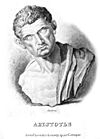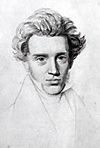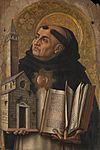Philosophy of religion facts for kids
Philosophy of religion is a part of philosophy. It explores big questions about religions and religious beliefs. This field uses understanding and logic to look at why people believe what they do. It also studies how religions are practiced and how they affect people's daily lives. Experts in this area might also look at religious texts using philosophy of language to understand their meaning. They might also offer criticism or new ideas about religion.
Contents
What Do Philosophers of Religion Study?
According to a philosopher named Winfried Löffler, there are different ways philosophers study religion. Many thinkers fit into more than one group:
- Religious Feelings: Some philosophers study the feelings that religions create. They look at emotions like awe, peace, or wonder. Friedrich Schleiermacher and Ludwig Wittgenstein are examples of such thinkers.
- The Core of Religion: Others try to find out what the true "essence" or main idea of religion is. Philosophers like Rudolf Otto, Georg Wilhelm Friedrich Hegel, and Martin Heidegger explored this.
- Religious Language: This group studies the special language used in religions. They look at how religious words and stories work.
- Religion and Science: Some philosophers compare religious explanations with scientific ones. They ask how these different ways of understanding the world fit together. Richard Swinburne and Ludwig Wittgenstein have worked on this.
- Is Religion Logical?: This area asks if religious beliefs can be explained using reason. It includes "proofs" for or against God's existence. It also includes Theodicy, which tries to explain why bad things happen if God is good. Gottfried Leibniz was the first to use the word "theodicy."
What Makes Something a Religion?
Philosophy of religion also looks at what features define a religion. There are two main ideas about this:
The "Essence" Idea
One idea is called Essentialist. It says that all religions share a common "essence" or main quality. Some ideas for this "essence" include:
- Belief in one or more gods.
- Belief in powerful spiritual beings.
- A belief in something holy or sacred that humans can connect with.
The problem with this idea is that it can be hard to find one definition that fits all religions.
The "Function" Idea
The other idea is called "functional." Instead of looking for an abstract "essence," it focuses on what religion does for people or societies. For example, religions can help people feel calm and balanced. They can also bring stability to a community. Thinkers like Karl Marx, Émile Durkheim, Bronisław Malinowski, and Talcott Parsons supported this view. However, critics say that religions can sometimes cause problems, not just stability.
Other Important Topics
Philosophers of religion also discuss other big questions:
- Arguments for God: They explore different arguments for the existence of God.
- The Problem of Evil: They think about the problem of evil. This asks why there is suffering in the world if a good God exists.
- God's Qualities: They study divine attributes, which are the qualities we give to God, like being all-powerful or all-knowing.
- Science and Religion: They look at the relationship between science and religion.
Important philosophers in this field include Thomas Aquinas, Augustine, and Alvin Plantinga. Philosophers of religion can be religious themselves or not religious at all.
Related pages
Images for kids
-
Pythagoreans Celebrate the Sunrise (1869) by Fyodor Bronnikov. Pythagoreanism is one example of a Greek philosophy that also included religious elements.
-
The Buddhist Vasubandhu argued against Hindu creator god views and for an impersonal conception of absolute reality that has been described as a form of Idealism.
-
The Blind men and an elephant is a parable widely used in Buddhism and Jainism to illustrate the dangers of dogmatic religious belief
-
William James wrote The Varieties of Religious Experience, 1902
-
Depiction of the theophany scene in the Bhagavadgita wherein Krishna reveals his universal form to Arjuna.
See also
 In Spanish: Filosofía de la religión para niños
In Spanish: Filosofía de la religión para niños









